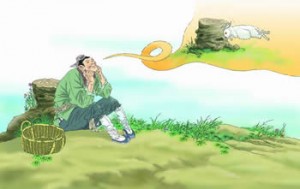Waiting for more hares to dash dead against the stump
Storyteller: “There is no free lunch”, “Pie in the sky”. We all know these phrases. They tell us to take efforts and work hard towards our goal; and don’t depend on luckiness or miracle. There is a Chinese edition of story for the same idea, and IMHO, it’s more vivid and fun than the two phrases.
Waiting for more hares to dash dead against the stump

waiting-for-more-hares
This story happened more than 2,000 years ago, in the Warring States period of China (475-221B.C.). There was a young farmer in the state of Song. His family had been farmers for generations. Year after year and generation after generation, farmers used to sow in spring and harvest in autumn, to begin to work at sunrise and retire at sunset. In good harvest years,they could have enough food to eat and enough clothing to wear.If there was a famine due to crop failure, life would be hard.
This young farmer wanted a better life, but was too lazy and coward to achieve any change or improvement. He only wasted his time daydreaming about unexpected blessings.
A miracle did happen to him anyway. One day, he was ploughing in the field, while groups of people were hunting nearby. As shoutings were rising one after another, scared animals were running desperately. Suddenly, a blind hare ran out of the woods, and dashed itself against a stump near his field. With its neck seriously twisted, the poor hare died immediately.
That day, the farmer had a great dinner. What a deal! Without any effort, he got a big fat hare for free. He thought: “It would be awesome if I can get this everyday.”
From then on, he never went farming any more. Every day, from morning till midnight, he stayed by the “lucky” stump and waited for more hares to dash themselves dead against the stump. He kept waiting, while the weeds in his abandoned field grew higher and denser day after day. He hoped the miracle would happen again…
Storyteller: Luckiness or miracle does happen once a while, but they do not happen everyday. Are you still waiting for your hares? On the other hand, this idiom is also used to show adhering to narrow experiences and not being able to be flexible.
[References]
1. 《韩非子·五蠹》 <Han FeiZi>
2. 百度百科 http://baike.baidu.com/view/29923.htm
[Recommended on Amazon]
1. Chinese Folktales: Chinese Folktales
2. A Chinese story book: A Collection of Ancient Chinese Stories
[Chinese Keyword]
守株待兔




I love these kind of stories.
I’ve written about similar things, but I haven’t phrased it so well as this. I think that it’s a great story, with a morale that all people should be able to relate to, if they choose to.
Thank You for your comment! that’s my first one!